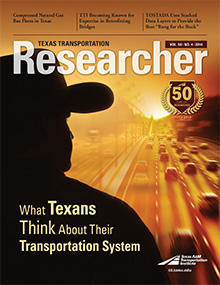
Agency Director
As Texas lawmakers prepare for the 84th Texas Legislative Session, one of the topics on their agenda is the Texas transportation system. How to maintain and enhance all modes of transportation in the state to benefit residents, business owners and travelers has been discussed in recent sessions.
Given innovations in technology and a growing population, what should the state’s network look like 20 or 30 years from now? How can we pay for maintaining the current infrastructure we have while adding needed improvements to meet future demand? How can Texas facilitate international trade for the country as a whole?
One thing is clear: we’ll need new solutions to answer these questions. The old way of doing things — simply building our way out of an ever-increasing demand on our infrastructure — won’t work anymore. In 2013, TTI launched the Transportation Policy Research Center (PRC), under the direction and support of the Texas Legislature, to conduct research and analyses to help guide lawmakers in finding those new solutions. As a result, PRC is looking ahead in the areas of finance, freight, congestion, technology, public engagement and transportation data.
This issue of the Texas Transportation Researcher profiles several center projects aimed at arming decision-makers with research for use in shaping transportation policy that will affect all Texans for decades to come. Notably, PRC recently conducted a statewide poll to gauge the public’s understanding of the state’s transportation system and preferences for future alternatives. Legislators can use the survey results to fashion more effective policy to better meet the needs of constituents. As you’ll read in these pages, PRC is also developing new tools on merging multiple data sets and exploring innovative travel demand management programs.
A number of other Institute research initiatives are improving transportation in Texas and beyond. On the international front, we’re helping to retrofit bridges to bring them up to current safety standards. Our Transit Mobility Program is working with agencies in Texas to help them better understand the challenges and benefits of converting their bus fleets to more environmentally friendly fuels, like compressed natural gas. And TTI’s award-winning Teens in the Driver Seat program has just received a $350,000 grant from State Farm to expand the reach of its peer-to-peer young driver safety program to 100 more high schools around the United States.
TTI research initiatives like those profiled in these pages are helping Texans at all levels, from the young drivers behind the wheel for the first time to elected officials working diligently to shape our state’s future. We’re like the navigator in the passenger seat on a long trip. Having another pair of eyes can help the driver stay on course and keep everyone in the car safe. And that’s what TTI research does for the state of Texas.

